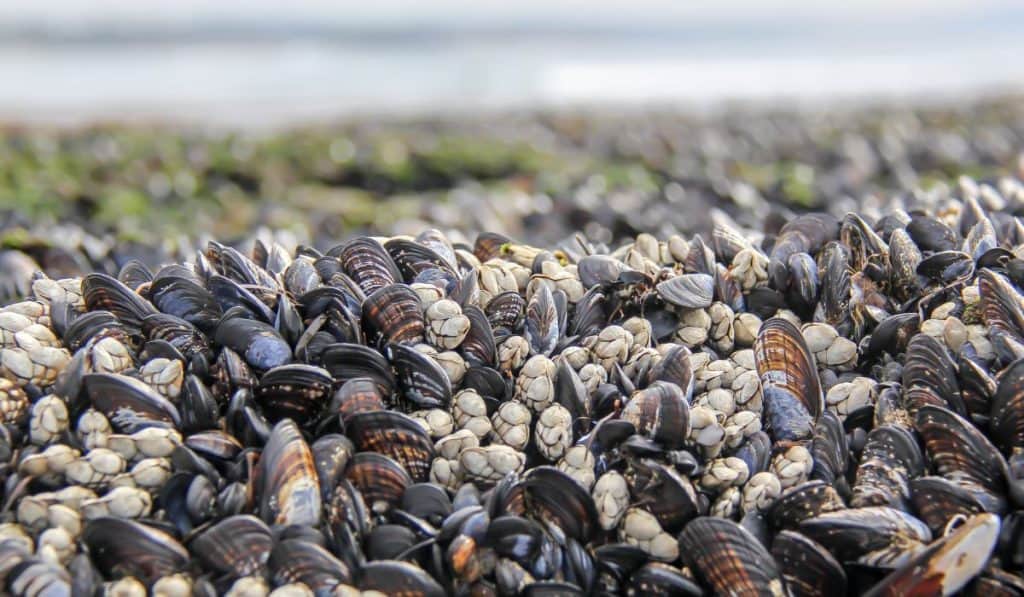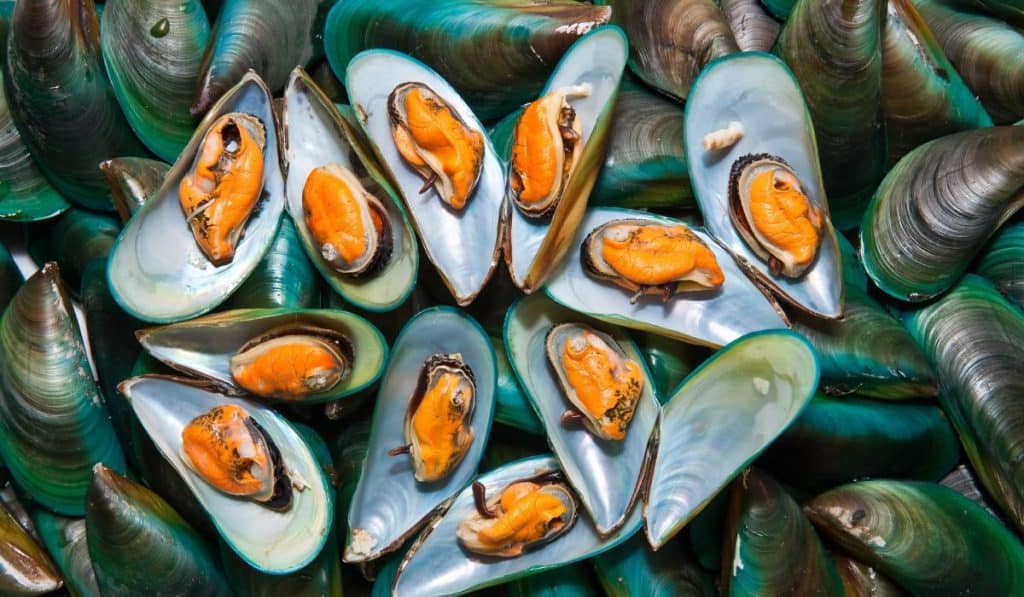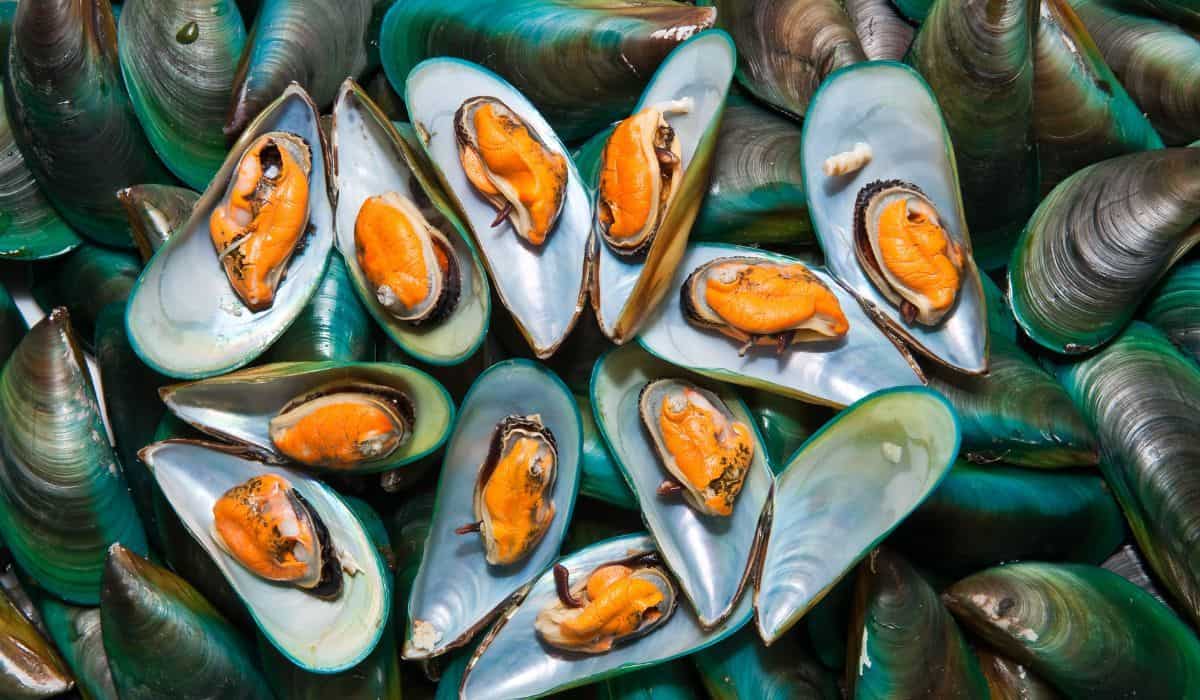Mussels are highly nutritious as they are excellent sources of protein and essential amino acids.
You can eat mussels from a lake (freshwater mussels), although they are less tasty than their saltwater counterparts.
How Are Freshwater Mussels Different From Marine Mussels?
The first difference between the two is where they’re found. You can find freshwater mussels in lakes, rivers, ponds, and streams, while marine mussels are in oceans and bays.
Secondly, they differ in their reproduction processes. Saltwater mussels reproduce externally, and fertilization takes place in the water outside their bodies.
The resulting larval mussels float around until they find a solid place to settle down and anchor themselves by their threads.
On the other hand, freshwater mussels fertilize internally. The female mussel produces eggs and then siphons in the sperm in the water from a male mussel.
She then carries the fertilized eggs in the gills until they develop into larvae.
Then, she releases them into the water, where they must find a fish on which they can attach themselves.
Once attached to the fish, they form a cocoon-like structure and stay there until a mussel is formed.

After the mussel forms, it then lets go of the fish and lands at the bottom of the lake to continue to grow.
The third difference between freshwater and marine mussels is how long they take to get to an edible size.
Marine mussels take about one and a half years to reach an edible size, while freshwater mussels take much longer.
This aspect is the cause of concern regarding freshwater mussel toxicity.
Are Freshwater Mussels Toxic? Can You Eat Them?
Yes, they could be toxic.
Mussels are filter feeders as they filter nutrients from the water around them. At the same time, they also filter impurities such as heavy metals and pathogens like E. coli bacteria.
Now, the toxins are not harmful to the mussels, but they are to the humans who ingest them.
The fact that freshwater mussels take longer to reach edible size means they accumulate more pollutants.
Therefore, you are exposed to a higher concentration of toxins by eating them.
So, can you eat freshwater mussels? Yes, you can, but you need to be extremely careful.
Here are some things to watch out for before eating mussels from a lake.
What to Consider Before Foraging and Eating Freshwater Mussels
The Water Quality of Your Lake or River
Is it clean, or is it polluted? It’s critical to get the data from the authorities in your area to make an informed decision.
Freshwater mussels have a long lifespan of up to 200 years, so the water they come from really matters.
The Regulations in Your Area
There are hundreds of freshwater mussel species in the world. Some are extinct, others are endangered, and many of the surviving ones are protected by the authorities.
Hence, you need to find out if it’s legal to forage freshwater mussels in your area.
In some States like Ohio, it’s illegal to forage mussels. In other States, such as Florida, some species are federally protected. One should not harvest them, and if found, you are fined.
Also, you need to ask about mussel size and bag limits for the mussel species that you can legally harvest.
For example, the Florida Shiny Spike must be three inches long, and there’s a bag limit of 20 half-shells per day.
In addition, there are regulations concerning the tools used to harvest mussels.
In some States, you can only gather them by hand, while in others, you can use tools like crowbars.
Lastly, you might be required to have a license to gather freshwater mussels. If so, ensure that you have one to avoid fines.
Picking the Right Mussels
Do not pick a mussel if it’s in any of these conditions:
- Chipped
- Broken
- Damaged
- Open (It means they’re dead)
Any such mussel is not safe to consume.
Tools Necessary for Gathering Freshwater Mussels
- Gloves to protect your hands.
- Tools such as crowbars, if allowed.
- A measuring ring if there are size restrictions for the species you intend to harvest.
- A bucket to carry your freshwater mussels.
How to Clean Mussels from the Lake
Mussels accumulate a lot of dirt and impurities from the water, so they need to be cleaned before cooking them.
Start by inspecting the mussels for any damage. Throw away any chipped or open mussels.
Then pull off the hairy skirts (beard) by your hand, taking them to one side. Once done, scrub the mussels under clean water to remove barnacles and impurities.
Then, soak the mussels in salty water for about 20 minutes to remove the impurities inside. The dirt will go to the bottom of your container, and you can lift the mussels from there.
To get the mussels as clean as possible, you can soak them two more times.
Cooking Freshwater Mussels
Now, you need to keep in mind that freshwater mussels are not as delicious as saltwater mussels. If you’ve had marine mussels before, don’t expect a similar taste.
Freshwater mussels are tough and can sometimes be inedible. To reduce their toughness, you might need to boil them for about five to six hours.

It’s advisable to salt the boiling water to enhance the taste. You can also add the mussels to your favorite soup for added flavor.
Alternatively, you can cook the mussels by grilling or baking them. With a quick Google search, you’ll find a good recipe.
Mussels open up once cooked, and it’s best not to overcook them as they tend to be chewy.
To eat them, you pull out the mussel meat from the shell. You can then discard the empty shells.
PS: Eat the mussels as soon as possible after harvesting, not more than two days.
Some people prefer to eat raw mussels. We do not advise this because mussels may contain pathogens.
Cooking kills some of the pathogens, thus making it safer to eat them cooked.
Conclusion
You can eat mussels from the lake as long as you’re sure about the water quality. Before going out to gather them, find out the regulations in your area and comply.
Also, due to the toxicity concerns of freshwater mussels, it’s best to only indulge once in a while. That way, you have lower chances of accumulating the toxins in your body.




